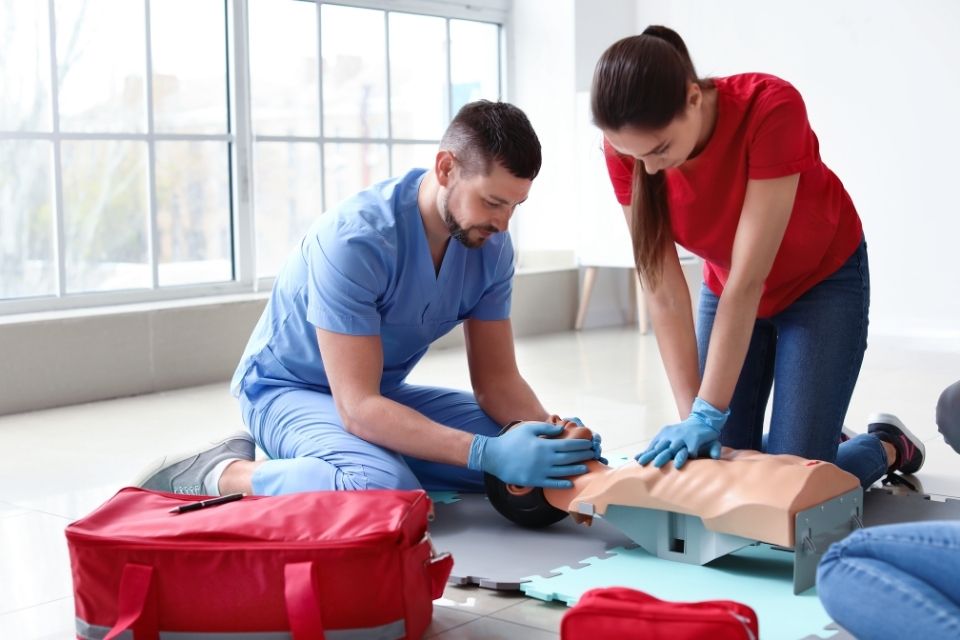Getting CPR certification is more than just ticking off a box on a to-do list. It’s about equipping yourself with the skills and knowledge to handle emergencies with confidence. Here’s why you should make CPR certification a priority today.
1. Be Prepared for Emergencies
Emergencies don’t come with a warning, and they often occur when least expected. Having CPR skills means you can step in and help during critical moments.
The time between someone collapsing and emergency services arriving can be crucial. CPR can keep blood flowing to the brain and heart, buying precious time.
Furthermore, CPR is needed in various situations—from heart attacks to drowning. Being prepared means you’re ready for many different types of emergencies.
2. Make a Real Difference in Your Community
When more people in your community are trained in CPR, the collective ability to respond to emergencies increases.
Community Impact:
- Workplaces – In many jobs, especially those involving children or physical activity, having CPR-certified employees is a must.
- Schools – Teachers and school staff trained in CPR can handle medical emergencies quickly, ensuring the safety of students.
3. Boost Your Confidence in Emergency Situations
Confidence in emergencies comes from training and practice. CPR certification provides both.
Courses teach you step-by-step procedures, so you’ll know exactly what to do in an emergency.
Many CPR classes include hands-on practice, which helps solidify your skills and builds your confidence.
4. Enhance Your Resume and Career Opportunities
Certifications can set you apart in the job market and demonstrate your commitment to safety and preparedness.
Career Benefits:
- Job Requirements – Certain roles require CPR certification as a prerequisite.
- Skill Enhancement – Even if it’s not a requirement, having CPR skills can make you a more appealing candidate for jobs in various fields.
5. It’s Easier and More Accessible Than You Think
CPR training is widely available and often more affordable than you might expect From in-person classes to online courses, there are numerous ways to get certified.
How CPR Certification Works
Understanding what goes into CPR training can help demystify the process and encourage you to get started.
What to Expect:
- Duration – Most CPR courses last between 2 to 4 hours, depending on the level of certification.
- Content – You’ll learn about performing chest compressions, rescue breaths, and how to use an Automated External Defibrillator (AED).
- Certification – Upon completion, you’ll receive a certification card, often valid for 2 years, after which you may need to renew.
Key Takeaways
To give you a clearer picture of why CPR certification is so beneficial, here’s a quick summary of its advantages:
- Be a Lifesaver: Knowing CPR can help you save lives in emergencies.
- Boost Confidence: You’ll handle emergencies with assurance and clarity.
- Support Your Community: Your skills will benefit those around you.
- Advance Your Career: Certification can enhance job prospects and professional skills.
- Easy Access: Training is convenient, affordable, and widely available.
Practical Steps to Get Certified
Ready to take the plunge? Here’s a simple guide to get you started:
- Research: Look for reputable organizations offering CPR certification.
- Choose a Course: Decide between in-person or online classes based on your preference.
- Enroll: Sign up for a class that fits your schedule.
- Attend Training: Engage fully in the course and practice the techniques.
- Receive Certification: Obtain your certification card and keep it updated.
The Bigger Picture: Lifelong Benefits of CPR Training
Beyond the immediate impact of being able to save lives, CPR training offers long-term benefits. It’s a skill that reinforces your ability to handle emergencies and makes you a more proactive and prepared individual.
Long-Term Impact:
Peace of Mind
Knowing you can respond effectively in a crisis brings peace of mind to you and those around you.
Community Safety
As more people get certified, the overall safety and readiness of the community improve.
Personal Growth
The process of learning and mastering CPR can be empowering and confidence-building.
Wrapping It Up: Take Action Today
CPR certification is more than just a skill; it’s a commitment to being prepared and capable in critical situations. With all the benefits—whether it’s improving community safety, enhancing your career prospects, or simply being ready to act when someone needs you—there’s no reason to delay.
So, take the first step today. Enroll in a CPR course and empower yourself with the knowledge and skills to make a difference. You never know when you might need to step up and save a life, but with CPR training, you’ll be ready.

